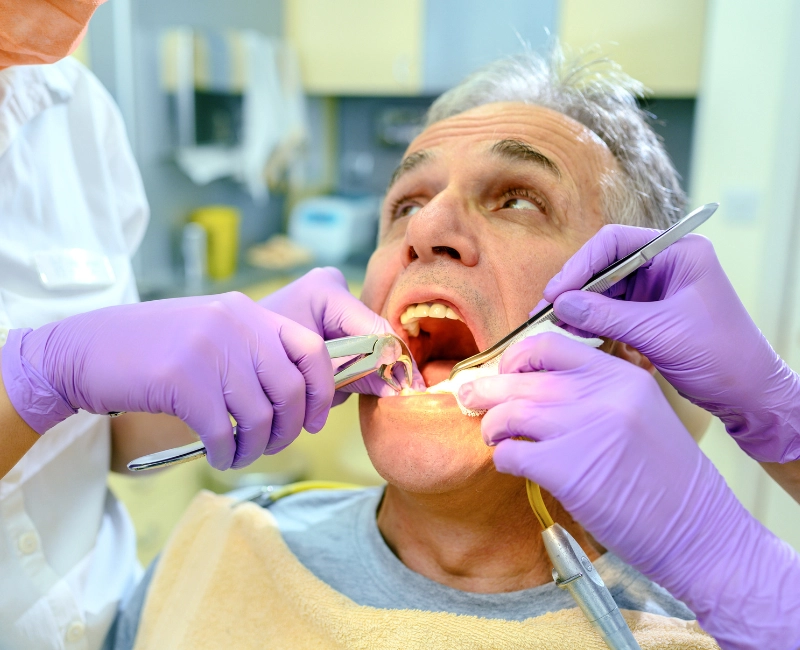Tooth Extractions in Woodbridge, Vaughan
Tooth extractions are a common dental procedure involving the removal of a tooth from its socket in the jawbone. While dentists strive to save natural teeth whenever possible, extractions are sometimes necessary to protect your oral health. Whether due to severe decay, infection, or overcrowding, tooth extractions play a vital role in maintaining a healthy mouth.


At Sunny Day Dental, we provide expert root canal treatments using the latest technology to ensure a comfortable and efficient experience:
- Experienced and Compassionate Team:Our dental professionals are highly trained and committed to providing gentle, patient-focused care.
- State-of-the-Art Technology: We use the latest dental technology to ensure accurate diagnoses and effective treatments.
- Comprehensive Dental Services: From preventive care to restorative treatments, we cover all aspects of general dentistry.
- Family-Friendly Environment: We cater to patients of all ages, making our practice perfect for the entire family.
What is a Tooth Extraction?
When Extractions Are Necessary
Tooth extractions are typically necessary when a tooth is damaged beyond repair, such as in cases of severe decay, trauma, or infection. In other cases, teeth may need to be removed to make space for orthodontic treatment or to prevent complications from impacted wisdom teeth.
Types of Extractions
- Simple Extractions: These extractions are typically performed on teeth that are fully visible and involve minimal discomfort. The dentist uses forceps to grasp the tooth and gently wiggle it free from its socket.
- Surgical Extractions: This type of extraction is necessary when a tooth is broken below the gumline or impacted. A small incision is made in the gum to access the tooth, and sometimes the tooth is divided into sections for easier removal.
- Wisdom Teeth Extractions: Wisdom teeth are often impacted and require surgical extraction. These procedures are common, especially among young adults, and help prevent future dental problems, such as crowding and infection.
Reasons for Tooth Extractions

Severe Tooth Decay
Impacted Wisdom Teeth
Periodontal Disease
Tooth Overcrowding
In preparation for orthodontic treatment, teeth may need to be removed to create space and align the remaining teeth properly.
Recovery After Tooth Extractions
- Avoid smoking, which can delay healing and increase the risk of complications.
- Stick to soft foods for the first few days, and avoid hot or spicy foods that may irritate the extraction site.
- Gently rinse with salt water to keep the area clean, but avoid vigorous rinsing or spitting, which can dislodge the clot.
Emergency Tooth Extractions
- Severe toothache that doesn't respond to pain relief.
- A cracked or broken tooth that cannot be saved.
- An abscess or infection that threatens your overall health.

 ZEEL PATEL2024-10-10Had an appointment there today. Excellent service by Krupal patel, highly recommended.
ZEEL PATEL2024-10-10Had an appointment there today. Excellent service by Krupal patel, highly recommended. Camilo Montoya2024-10-10Went in for a tooth extraction and couldn’t be happier. Krupal was very pleasant to talk to and dr. Saujanya was awesome. Thank you guys.
Camilo Montoya2024-10-10Went in for a tooth extraction and couldn’t be happier. Krupal was very pleasant to talk to and dr. Saujanya was awesome. Thank you guys. humraj dhaliwal2024-10-10dr. manoj was excellent. i would recommend this clinic to anyone looking for great service.
humraj dhaliwal2024-10-10dr. manoj was excellent. i would recommend this clinic to anyone looking for great service. Mandeep Dhaliwal2024-10-08I had an amazing experience at Sunny dental clinic. From the moment I walked in, the staff was warm, welcoming, and very professional. The clinic itself was clean and modern, making me feel comfortable right away.
Mandeep Dhaliwal2024-10-08I had an amazing experience at Sunny dental clinic. From the moment I walked in, the staff was warm, welcoming, and very professional. The clinic itself was clean and modern, making me feel comfortable right away. Unrao sandhu2024-10-08I had a fantastic experience at Sunny Day Dental Clinic! The staff was welcoming and attentive, making me feel comfortable from the moment I walked in. Kruapl was incredibly knowledgeable and made the entire process seamless. They took the time to explain every step and address all my concerns. The clinic is clean, modern, and equipped with the latest technology. I highly recommend Sunny Day Dental for anyone looking for top-notch dental care!
Unrao sandhu2024-10-08I had a fantastic experience at Sunny Day Dental Clinic! The staff was welcoming and attentive, making me feel comfortable from the moment I walked in. Kruapl was incredibly knowledgeable and made the entire process seamless. They took the time to explain every step and address all my concerns. The clinic is clean, modern, and equipped with the latest technology. I highly recommend Sunny Day Dental for anyone looking for top-notch dental care! Harvir Gill2024-10-08I had an outstanding experience at Sunny Day Dental. From the moment I walked in, the staff was friendly and the clinic had a clean, inviting atmosphere. A special shoutout to Krupal, who was incredibly helpful and professional. She took the time to explain everything, making sure I felt at ease throughout my visit. I highly recommend this clinic for anyone seeking top-notch dental care!
Harvir Gill2024-10-08I had an outstanding experience at Sunny Day Dental. From the moment I walked in, the staff was friendly and the clinic had a clean, inviting atmosphere. A special shoutout to Krupal, who was incredibly helpful and professional. She took the time to explain everything, making sure I felt at ease throughout my visit. I highly recommend this clinic for anyone seeking top-notch dental care! Gurnoor Bajwa2024-10-08I recently had a great experience at Sunny Day Dental for my check-up and cleaning. The dentists were knowledgeable and thorough, making me feel comfortable throughout the process. Krupal, the office manager, was exceptionally nice and helped ensure everything went smoothly. Based on this positive experience, I’ve decided to switch clinics for my future dental care. Highly recommended!
Gurnoor Bajwa2024-10-08I recently had a great experience at Sunny Day Dental for my check-up and cleaning. The dentists were knowledgeable and thorough, making me feel comfortable throughout the process. Krupal, the office manager, was exceptionally nice and helped ensure everything went smoothly. Based on this positive experience, I’ve decided to switch clinics for my future dental care. Highly recommended! Diane Sebastiani2024-10-07Very accommodating for appointments, no wait, friendly and reasonable. Recommend
Diane Sebastiani2024-10-07Very accommodating for appointments, no wait, friendly and reasonable. Recommend Nav Singh2024-10-05My appointment with Sunny Day Dental went really well today. I got my teeth cleaning and general checkup done. The service was really great and the dentist was really professional. I highly recommend this place!
Nav Singh2024-10-05My appointment with Sunny Day Dental went really well today. I got my teeth cleaning and general checkup done. The service was really great and the dentist was really professional. I highly recommend this place! Barbara Agyei2024-10-05I have been coming here for years as a steady patient for years and I wouldn't change my dental location for any other. They are very attentive, very thorough and the customer service is always great. I would definitely recommend.
Barbara Agyei2024-10-05I have been coming here for years as a steady patient for years and I wouldn't change my dental location for any other. They are very attentive, very thorough and the customer service is always great. I would definitely recommend.
Frequently Asked Questions
Q1. How long does it take to heal after a tooth extraction?
Q2. Is tooth extraction painful?
Q3. Can I drive home after a tooth extraction?
Q4. How much does a tooth extraction cost in Woodbridge?
The cost of tooth extractions varies based on the complexity of the procedure. Simple extractions typically range from $150 to $300, while surgical extractions can cost $300 to $600 or more.
Q5. Will my insurance cover the cost of tooth extraction?
Many dental insurance plans cover the cost of tooth extractions, especially if the procedure is deemed medically necessary. Check with your insurance provider to understand your coverage.
